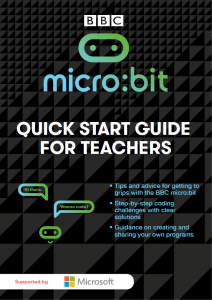With just a few months to go before one million children take delivery of their BBC micro:bits, teachers are taking their first lessons in how the device will inspire the next generation of digital makers in the UK.
To help them get up to speed quickly we have built a range of support services to ensure that teachers and young people can get the very most out of the devices in the classroom and out of it. These include more than 22,000 quick start guides which will begin to go out to teachers today, hands on lessons for CAS master teachers up and down the country and the BBC micro:bit website and coding environment.
For those taking their first steps, the BBC micro:bit Quick Start Guide for Teachers is now available to download from the Microsoft website. It is an indispensable guide for teachers, showing them how to get started and how to create programs for the device.  From unboxing to set up and on to programming a Minecraft Creeper, creating a digital pet or coding a Rock, Paper, Scissors game, the book gives teachers step-by-step lesson plans and walkthroughs. These are designed to simplify the learning process and, when the time comes, help young people take the basic building blocks and bring their own ideas to life.
From unboxing to set up and on to programming a Minecraft Creeper, creating a digital pet or coding a Rock, Paper, Scissors game, the book gives teachers step-by-step lesson plans and walkthroughs. These are designed to simplify the learning process and, when the time comes, help young people take the basic building blocks and bring their own ideas to life.
Even in testing we’ve been amazed at how even relatively inexperienced users have built things we could only dream about – from games controllers to light sabres, to warning alarms for approaching parents.
Alongside this learning resource, Microsoft has scheduled an ambitious national roadshow across all 10 CAS regional centres, from Southampton to York via London and Birmingham. One day workshops for hundreds of CAS Master Teachers will give them a chance to get a hands-on experience of the BBC micro:bit, explore the website and learn how the device works.
The BBC micro:bit website, which houses Microsoft’s easy-to-use programming environment, also went live today. As well as giving teachers another range of tailored support tools, it allows pupils to sit at home, connect their micro:bit and program the device using a browser-based coding and content platform called Touch Develop.
The distribution of BBC micro:bits to every single Year 7 child or equivalent in the UK is a monumental undertaking designed to help the next generation develop the digital skills they so desperately need. But sending the devices out without support wouldn’t have helped us to achieve our ambitious goals. To get children excited about coding, and teachers excited about teaching it, we need to help them.
The Quick Start Guide, the BBC micro:bit website and the CAS national roadshow will all help to ensure that the teachers are ready to make the micro:bit launch a success. Soon, every Year 7 pupil in the country will own a codeable device and, just as importantly, they will have the resources and support to help them use it.





